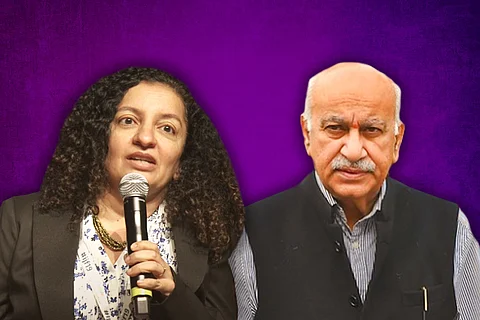

In a landmark judgment that alters the future of the Me Too movement in India, Delhi’s Rouse Avenue Court on Wednesday held journalist Priya Ramani not guilty in the criminal defamation case filed against her by MJ Akbar over allegations of sexual harassment. Pronouncing the verdict on Wednesday, Additional Chief Metropolitan Magistrate (ACMM) Ravindra Pandey observed, "even a man of social status can be a sexual harasser."
"Sexual abuse takes away dignity and self confidence. The right of reputation cannot be protected at the cost of right to dignity," the judge said, adding, "a woman has right to put her grievance even after decades."
The court had on February 1 reserved the judgment after counsels for Akbar as well as Priya completed their arguments. The judge was earlier scheduled to pass orders on February 10, but adjourned the verdict by a week saying that he did not get written submissions on time.
Wednesday's verdict brings to close a case that has spanned over two years, since MJ Akbar, a former Union Minister in the Narendra Modi Cabinet, filed a criminal defamation case against journalist Priya Ramani, after she alleged on Twitter that Akbar, a former journalist, had behaved inappropriately with her when he was her boss at Asian Age. Akbar had said in his complaint that Priya “committed the offence of ‘defamation' as defined under Section 499 IPC and made punishable under Section 500 IPC.”
In the wake of the Me Too movement in India in October 2018, Priya Ramani shared a Vogue article she had penned in 2017 about a “male editor” who had behaved inappropriately with her, and on October 8, Priya tweeted that it was about MJ Akbar, who was then a Minister of State in the Ministry of External Affairs in the Union government. Priya had spoken about the incident from 1994 when MJ Akbar interviewed her in a plush south Mumbai hotel. She said that he had offered her a drink and when she refused, he asked her to sit next to him on the bed.
After Priya's tweet, around 20 women shared their experiences, and all of them pointed to a pattern in Akbar's alleged behaviour — suggestive statements to women journalists working under him, setting up job interviews in hotel rooms, calling women journalists to his office, meeting them at odd hours.
Akbar filed a complaint against Priya on October 15, 2018, for allegedly defaming him by accusing him of sexual misconduct decades ago when he was a journalist. He resigned as Union Minister on October 17, 2018.
In his complaint, Akbar stated that Priya “resorted to a series of maliciously fabricated allegations, which she is diabolically and viciously spreading using media,” and that “it is also apparent that false narrative against the complainant (Akbar) is being circulated in a motivated manner and for the fulfillment of an agenda.”
During the hearings in the defamation case, Akbar denied the allegations of sexual harassment by all the women who came forward during the #MeToo campaign against him.
During the trial, MJ Akbar, represented by senior advocate Geeta Luthra, accused of sexual harassment, denied all the charges against him, and claimed that Priya’s allegations against him had “damaged his stellar reputation,” and that she had “defamed him” by using adjectives such as 'media's biggest predator' against him. Priya, on the other hand, represented by senior advocate Rebecca John, had maintained that her allegations against Akbar were her truth, and that she had disclosed her allegations against Akbar in "good faith" for the "public good" and, therefore, the allegations did not amount to defamation. She added that “no human being accused of sexual harassment can be a person of high reputation.”
During the hearing, journalist Ghazala Wahab and Priya’s friend Niloufer Venkataraman took the stand in her defence. While Ghazala shared her own testimony when she allegedly faced sexual harassment from Akbar, Niloufer testified that Priya was disturbed after her 1994 meeting with Akbar, the day when the alleged sexual harassment took place. Priya Ramani also shared the Firstpost article Akbar himself had presented in court, in which as many as 14 women had shared how they were similarly sexually harassed by Akbar.
For Akbar, Joyeeta Basu, the editor of Sunday Guardian, Veenu Sandal, a tarot card reader, Tapan Chaki, a corporate communications executive, and businessman Sunil Gujral took the stand in defence, attesting that Akbar was a "man of good character." Basu told the court that Akbar was “the best boss” she had worked with.
Last year in October, after two years of hearings had already taken place, there was a possibility that the case may be moved out of the court.The Additional Chief Metropolitan Magistrate who was hearing the case, Vishal Pahuja, told both the parties that the court could only hear cases filed against MPs or MLAs, and cannot hear cases filed by them. Later, though the case was moved back into this court, ACMM Vishal Pahuja was transferred and a new ACMM, Ravindra Kumar, began hearing final arguments again.
At the time, ACMM Ravindra Kumar had also asked the two parties whether there was any chance of settlement in the case. While senior advocate Geeta Luthra, appearing for Akbar, said that if Priya was apologetic for her allegations, she would ask him to consider closing the complaint, Priya’s counsel, Bhavook Chauhan, said that she stands by her statement and if Akbar wanted to withdraw the complaint, he may do so.
The court reserved its orders on February 1.